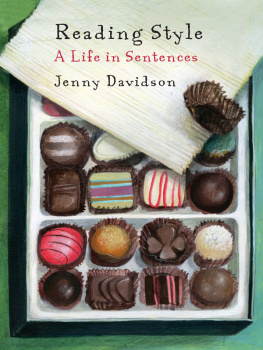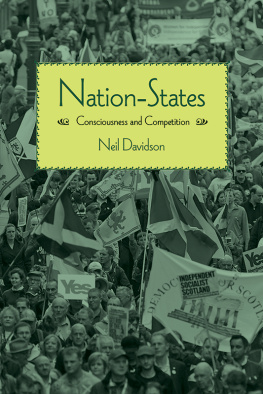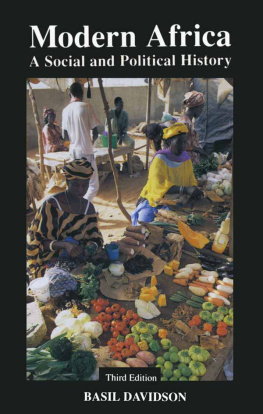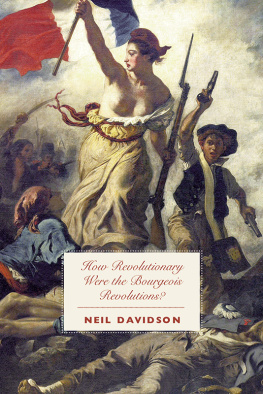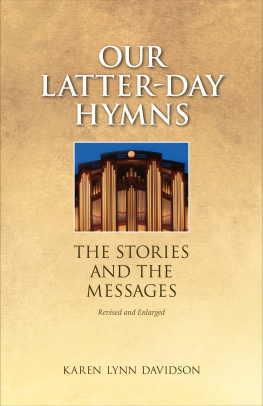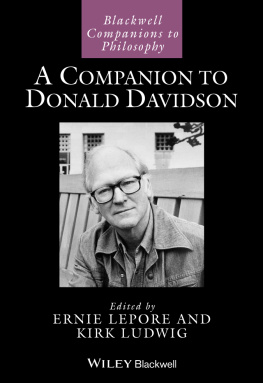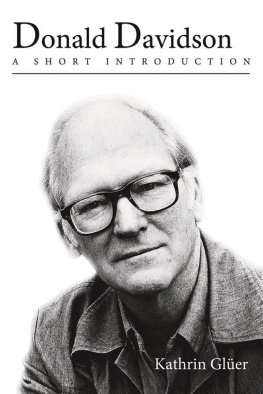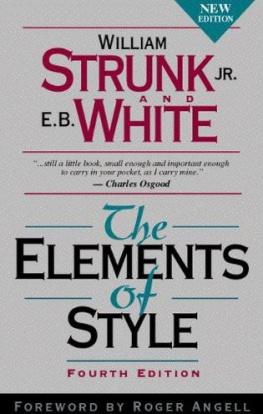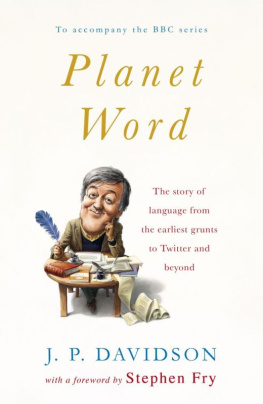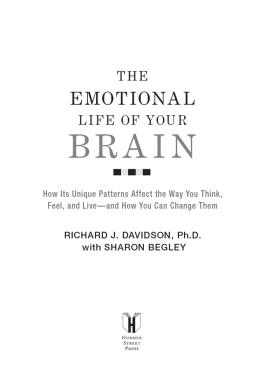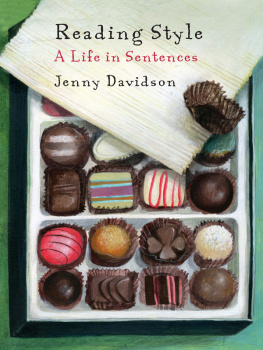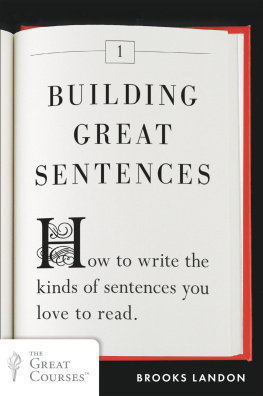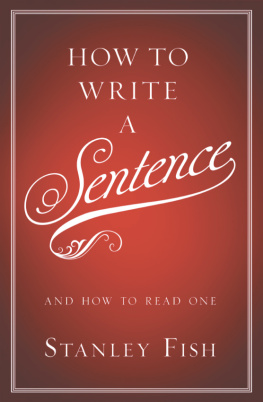Reading Style
Reading Style
A Life in Sentences
Jenny Davidson
Columbia University Press
New York
Columbia University Press
Publishers Since 1893
New York Chichester, West Sussex
cup.columbia.edu
Copyright 2014 Jenny Davidson
All rights reserved
E-ISBN 978-0-231-53740-7
Library of Congress Cataloging-in-Publication Data
Davidson, Jenny.
Reading style : a life in sentences / Jenny Davidson.
pages cm
Includes bibliographical references and index.
ISBN 978-0-231-16858-8 (cloth : alk. paper) ISBN 978-0-231-53740-7 (electronic)
1. Readability (Literary style) 2. Style, Literary. 3. Grammar, Comparative and generalSentences. 4. Grammar, Comparative and generalSyntax 5. Criticism, Textual. 6. LiteratureStudy and teaching. I. Title.
PN204.D38 2014
809dc23
2013030998
A Columbia University Press E-book.
CUP would be pleased to hear about your reading experience with this e-book at .
Cover design by Julia Kushnirsky
Cover illustration by Mara Cerri
References to websites (URLs) were accurate at the time of writing. Neither the author nor Columbia University Press is responsible for URLs that may have expired or changed since the manuscript was prepared.
For my teachers, my students and everyone else who has ever talked with me about books
To snare a sensibility in words, especially one that is alive and powerful, one must be tentative and nimble. The form of jottings, rather than an essay (with its claim to a linear, consecutive argument), seemed more appropriate for getting down something of this particular fugitive sensibility.
Susan Sontag, Notes on Camp (1964)
The most direct probe of the intensity of our ludic readers needs to escape from unpleasant consciousness is Question 3a in the Reading Habits Questionnaire (scored in chapter 5 as part of the Frustration Index); namely, how would one feel to discover, alone in a strange hotel, that one had nothing to read. This question elicited a range of replies from the 129 students readily scored in terms of their affective tone and intensity. These dimensions are even more clearly discerned in the response of the 28 ludic readers who replied to this question. In approximate sequence of intensity, with headings selected on intuitive grounds to describe the tone of the response, these 28 replies are set out below (if more than one reader made a given response the number who did so is indicated in parenthesis):
No emotion: nothing
Displeasure: restless (2), frustrated (5), annoyed, peeved, a bit hassled
Anger: bloody annoyed
Agitated: manic, bothered, a little upset, let down, disappointed, bad, bitterly disappointed, terrible
Anxiety: lost (2), quite lost, lost and miserable, really miserable, desolate!, awful/dispossessed, desperate
Victor Nell, Lost in a Book: The Psychology of Reading for Pleasure (1988)
CONTENTS
I ve always been bothered by the notion that literature is worth reading chiefly for what it teaches us about life. Of course we learn things about life from literature: its self-evident that a book may make its reader wiser or more philosophical in some measure consequent upon the nature of the book itself, the timing and circumstances of the readers encounter with it and the readers openness to transformation. But there is also something intolerably banal about the idea that the main reward of reading a novel by Leo Tolstoy or George Eliot should be my becoming a slightly better person. Partly I am troubled that the motive of pleasure recedes so far from view. This kind of emphasis on self-improvement also steals the limelight from a more stringently cognitive aspect of reading. Not the simple fact of transportation, of being lost in a book, but rather a form of intellectual play that seems to me ultimately as ethical as its lesson-driven counterpart: ethical in the sense of its developing ones capacities of comprehension to the fullest, taking the jumbled furniture of the human mind (the meager apparatus of Lears poor, bare, forked animal) and teaching it to make meaning out of words. To make the idea that literature tells us about life the primary reason for reading Laurence Sterne, Jane Austen, Virginia Woolf and their like degrades the very thing that draws me to literature in the first place: the glimmer of the sentences, not first and foremost the wisdom contained in them. By stripping literary language down to its constituent parts, I perversely gain a sense of transcendence, an emotional as well as intellectual liberation that comes by way of the most precise consideration of details of language.
All sentences are not created equal. Some are more interesting, more intricate, more attractive or repellent than others. This book originated in a series of lectures I gave at Columbia University in the fall of 2009. The course was called On Style, and we read through what I think of as one of the central genealogies of the European realist novel (Emma, Madame Bovary, The Golden Bowl and the opening chunk of In Search of Lost Time) along with a more idiosyncratic set of sequels in style: shorter pieces by Georges Perec, Roland Barthes, Susan Sontag, Wayne Koestenbaum, Luc Sante and Gary Lutz, and then W. G. Sebalds The Rings of Saturn and Alan Hollinghursts The Line of Beauty, with Sebald representing the culmination of one line of thought as to what might be done in the novel by way of a Proustian first-person subjective narrating intelligence and Hollinghurst standing for the radical reimagining of a third-person mode of narration associated with Gustave Flaubert and Henry James. That sequence of readings remains the core of the book, though I have trimmed the discussions of Flaubert and Marcel Proust and permitted myself to roam more freely and waywardly between texts and topics than the license of a class syllabus necessarily permits. Most of all, I have allowed my extracurricular reading to inflect the books observations about style and sensibility. I am in possession of a novel-reading habit that invites terms like compulsion or addiction, and that on the face of things has little to do with my working life as a professor of literature. (Being a fast and voracious reader is not a necessity for academic life, merely a valuable convenience.) Visiting our family in the United States the summer I turned five, my English grandmother was sufficiently worried about the extent and intensity of my reading that she wanted my mother to take me to the doctor, and my reading undoubtedly remains excessive, unbalanced.
My guide, in terms of the selection of texts, has been personal taste, not representative coverage of the full range of possibilities for literary language in English. One reader of an earlier draft of this book commented on its having been fairly standard, in the middle of the twentieth century, to tell a story about the great tradition of fictional prose style that began with Austen or Flaubert, proceeded through James and Proust to high modernism (James Joyce, D. H. Lawrence, Woolf) and thence to Samuel Beckett or the French new novel (Alain Robbe-Grillet, Nathalie Sarraute et al.). To some extent I take that story for granted, but its not a story I see the need to retell. Indeed, I am not really interested in making an argument about style, what it is and its genealogies in the Anglo-American novel. The rationale for the inclusion of each passage I write about is often just that it speaks to me stronglythat it has a high glimmer factoror that it lets me single out some aspect of style on which I wish to comment. If there is an argument here, it operates in the fashion of a field notebook, by way of selection and description, as an entomologist or ornithologist might not merely transmit something of a way of looking, sharpening the tools of perception, but perhaps also begin to elicit a deeper comprehension of how to know which objects most reward such scrutiny.

